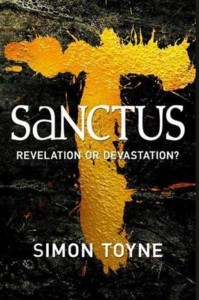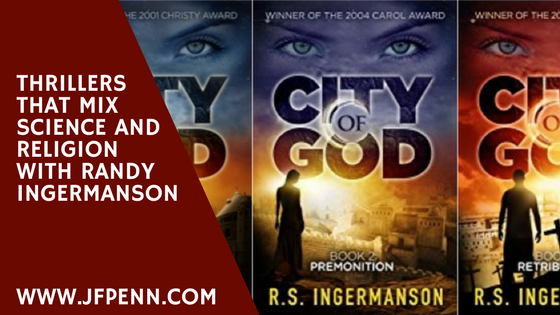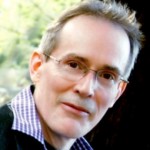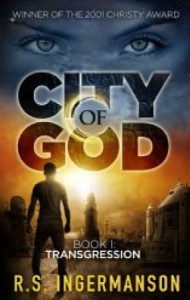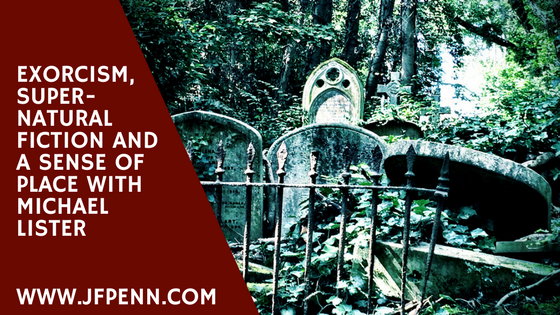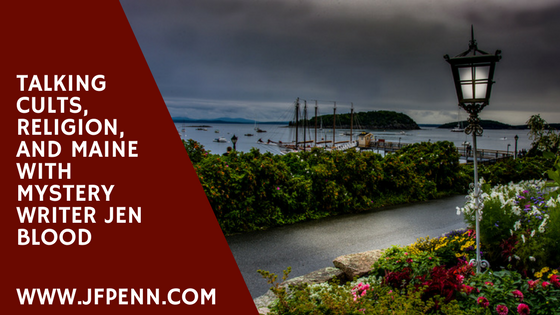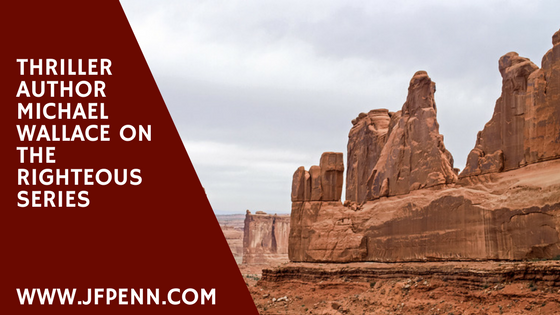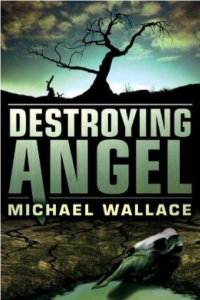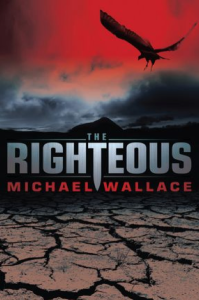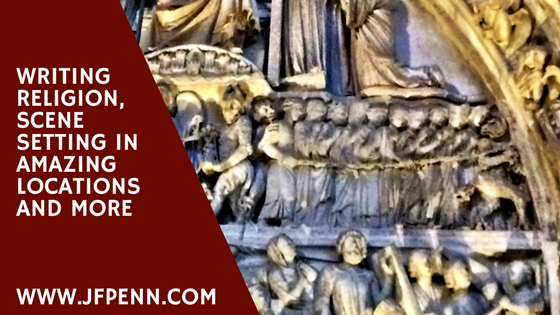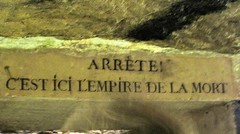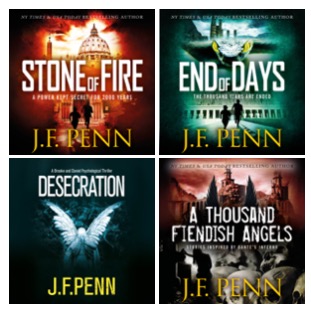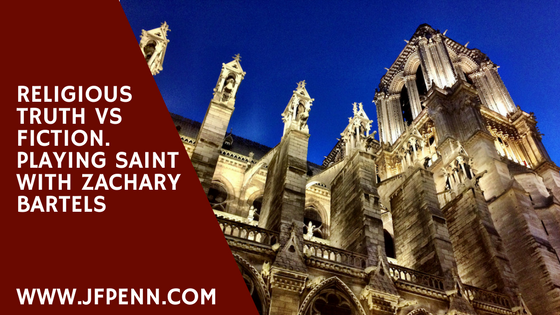 Zachary Bartels' latest book Playing Saint opens with an exorcism and a murder scene with satanic symbols. It also features a mega-church and Vatican operatives, and in this interview, I ask Zach to talk a bit about the book and the thoughts behind it.
Zachary Bartels' latest book Playing Saint opens with an exorcism and a murder scene with satanic symbols. It also features a mega-church and Vatican operatives, and in this interview, I ask Zach to talk a bit about the book and the thoughts behind it.
As an introduction, Zachary Bartels is an award-winning preacher and Bible teacher, serving as pastor of Judson Memorial Baptist Church in Lansing, Michigan, where he lives with his wife Erin and their son. He holds degrees from Cornerstone University and Grand Rapids Theological Seminary. Zachary enjoys film, fine cigars, stimulating conversation, gourmet coffee, reading, writing, and cycling.
Tell us about your own religious background and how you've incorporated that into the books.
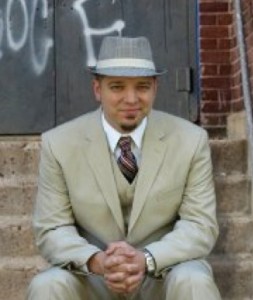 Well, I used to be a Vatican assassin from 1999-2004, during which I dealt with a very large number of occult-related murders.
Well, I used to be a Vatican assassin from 1999-2004, during which I dealt with a very large number of occult-related murders.
Just kidding; I’m a Baptist minister with a pretty vanilla background. I do tend to incorporate my experiences as a pastor into characters (part of my “brand,” as they say), but mostly I would imagine my religious background relates to my books much like yours does to your books—meaning that, when you spend so much time studying all sorts of fascinating beliefs, rites, traditions, etc., from East to West and from ancient times to the present, your imagination starts spinning off what-ifs, which then grow up into full-blown stories.
How do you walk the line between what some consider religious truth and fiction?
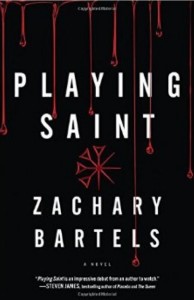 I think it works in my favor that I really do believe in the religious angle of my novels (the reality of demonic oppression, the power of Christ’s cross, etc.).
I think it works in my favor that I really do believe in the religious angle of my novels (the reality of demonic oppression, the power of Christ’s cross, etc.).
Don’t get me wrong; I’ve enjoyed many a supernatural/religious thriller (in print or film) created by people who were approaching their work as straight-up fantasy, but my readership is primarily made up of evangelical Christians who share my beliefs. For that reason, I have to tread lightly around issues of doctrine and avoid writing in a way that might come across as flippant when dealing with things sacred. I’ve already had a couple negative reviews along the lines of: how can he employ all that snarky humor when dealing with such serious topics? However, I like to think that most readers (regardless of their personal beliefs) know that picking up a novel generally means suspending disbelief and giving a little latitude for the sake of entertainment.
 My early influences in religious fiction included ‘This Present Darkness' by Frank Peretti.
My early influences in religious fiction included ‘This Present Darkness' by Frank Peretti.
What were some of your influences for your books? What do you read for pleasure now?
Peretti’s work is definitely one of the strongest early influencers on me as well. I also love Stephen Lawhead’s stuff and Paul Maier’s religious thrillers.
Less predictably, I love Chuck Palahniuk’s works and the late Elmore Leonard, as well as the more out-there stuff like Duane Swierczynski. In the last couple years, I’ve also been tearing through Cliff Graham’s gritty biblical war epics.
I read your first book, 42 Months Dry, about the prophet Elijah a few years back, which covers a more historical thriller perspective.
How has your writing developed since then?
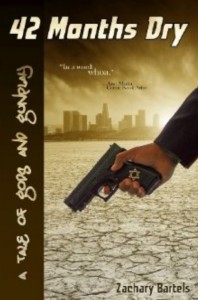
I was already listening to your podcasts while I was putting it together and I always heard you and your guests telling everyone to hire an editor, and I always thought, “Yeah, that’s a good idea…but not for me of course.” I wonder how many indie writers have that same assumption and how much better their work could be if they tossed it and let someone else inject some years of editorial experience into their work.
What are the themes that keep recurring in your writing? That obsess you?
This was totally unplanned, but I recently realized that both of my contracted novels with HarperCollins (as well as 42 Months Dry to some degree) are about the issue of identity.
By that I mean, determining who you really are underneath your titles, degrees, profession, etc. And, not surprisingly, there’s a whole lot about Jesus in there too—hopefully presented in a way that appeals broadly to readers of varying beliefs and backgrounds.
Many thriller authors are criticized for portraying violent crime and too much death in their books. How do you handle that criticism?
A couple of my early editorial reviews have mentioned the “on-screen” violence and rather bloody crime scenes, but it hasn’t been a deal-breaker. It’s a curiosity of the CBA marketplace that violence has kind of been given a pass, while a naughty word or even sidelong reference so something sexual would be shot on sight by pretty much any editor.
Personally, I think Playing Saintis PG-13 at most and I tried not to include death and violence for death and violence’s sake.
What's next for your writing?
My next novel, The Last Con (about a reformed con man forced back into a life of crime, with some secret societies, relics, and conspiracies to boot) comes out next June. It’s in line edit now. I’m just starting to outline another book that I hope to pitch soon..
Where can people find out more on you and your books?
My website is www.zacharybartels.com or you can follow me on Twitter @AuthorZBartels
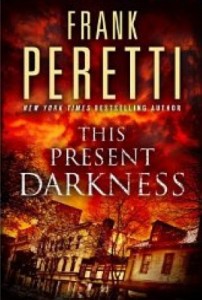
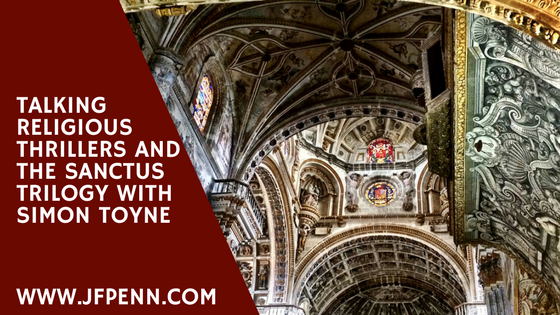
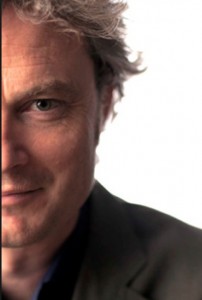 Simon Toyne
Simon Toyne